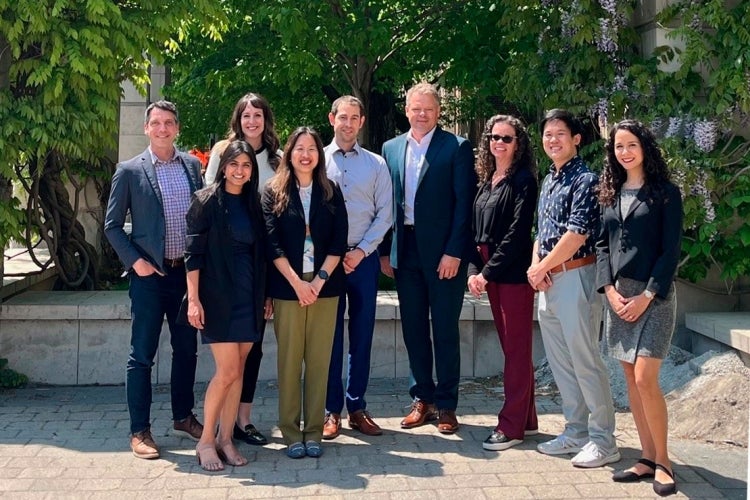Researchers from across the University of Toronto are teaming up with chemicals giant BASF to develop an array of technologies for sectors from agriculture to architecture.
Several projects have been launched so far under a new framework agreement for collaborative research , the first one BASF has signed with a Canadian university.
Many of the projects involve self-driving labs, which use AI and automation to create new materials and molecules for a fraction of the usual time and cost. Self-driving labs are at the core of the Acceleration Consortium , a U of T institutional strategic initiative .
"The question we often need to answer when creating new chemical products is: given these design constraints, how many different possible molecules or formulations could we make?" says Frank Gu, a professor in the Faculty of Applied Science & Engineering's department of chemical engineering and applied chemistry, and one of several U of T researchers involved in the collaboration.
"A human mind might be able to come up with two, three or maybe 10 different possibilities. But using AI, we can generate hundreds, including ones we might never have thought of otherwise."
Within these model chemical libraries, AI algorithms can quickly conduct large numbers of virtual tests to screen for the most promising solutions. These can then be synthesized and tested in a physical lab, with the results fed back into the model to improve future iterations.
For example, Gu and his collaborators are working with a family of naturally occurring biopolymers derived from plants.

Agricultural researchers have previously tested some of these molecules as biostimulants that could help activate the natural defences of a target crop against pests or disease. But they also have other useful properties.
"These biopolymers are very hydrophilic materials, which means they are able to absorb and retain water," says Gu. "By taking up water when the soil is too wet, and releasing it when it is too dry, they can help regulate soil moisture.
"On top of that, they can also be used as delivery vehicles: we can wrap an active ingredient, like a pesticide or fertilizer, in a coating made of these biopolymers. If we design the coating well, it can slowly release the active ingredient next to the plant, where needed, rather than letting it get washed away by rain."
Using the biopolymers for targeted delivery can enable farmers to use less of the active ingredient and reduce pollution associated with agricultural runoff, improving the sector's economics and sustainability.
The challenge is that there are hundreds of potential biopolymer formulations to choose from. By working with the Acceleration Consortium - where Gu co-leads the Formulations self-driving lab - the team is betting that the power of self-driving labs can speed up the search.
The project is just one of many catalyzed by the new agreement with BASF, which builds on previous collaborations with U of T researchers including Eugenia Kumacheva and Mitchell Winnik, University Professors of chemistry in the Faculty of Arts & Science.
In addition to agriculture, some of the collaborations are focused on new coatings that can extend the life of architectural materials, while others aim to deliver drugs to targeted areas of the human body.
"For us, it's all about molecules," says Gu. "Whether we are delivering an anti-cancer drug or a smarter crop application or a protective coating, it's all about finding the best potential solution out of the huge number of possibilities."
By offering collaboration opportunities in cutting-edge research and leveraging innovative technologies, U of T and BASF researchers are aiming to solve challenges in sustainability, aligning with BASF's mission in creating chemistry for a sustainable future.
"The projects in scope are advancing efforts in predictive properties, advanced biomaterials and sustainable delivery of agrochemicals," says Wen Xu, senior principal scientist, agricultural solutions at BASF. "Overall, our collaboration with the University of Toronto promises significant advancements in sustainable agriculture through innovative research and development."
Xu is involved in three of the new collaborations signed under the agreement - with Gu, Professor Christine Allen of the Leslie Dan Faculty of Pharmacy, and Professor Alán Aspuru-Guzik of the Faculty of Arts & Science.
The other collaborations will see Kumacheva work with Liangliang Echo Qu, senior scientist, Research North America at BASF; and Justin Nodwell, professor of biochemistry in U of T's Temerty Faculty of Medicine, partnering with BASF's Ai-Jiuan Wu, senior research scientist III, agricultural solutions and Kavita Bitra, multicrop and innovation sourcing lead, agricultural solutions.
David Wolfe, U of T's acting associate vice-president, international partnerships, says U of T has "placed a big bet" on materials innovation by harnessing the university's breadth of expertise in areas ranging from AI and robotics to chemistry and pharmaceuticals. "But in order for our research to truly move the needle in this field, we need to work with world leaders who develop, validate and manufacture materials at scale," said Wolfe.
"BASF, as one of the world's largest and most innovative chemical companies, is better positioned than anyone to inspire - and be inspired by - the work we do."






